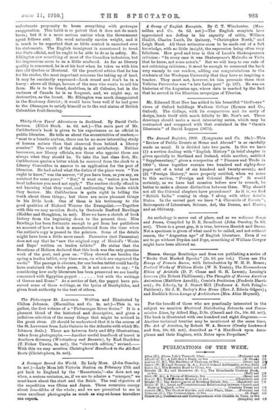Thirty - three Years' Adventures in Bookland. By David Oath- bertson. (Elliot
Stock. 4e. 6d. net.)—The main part of Mr. Cuthbertson's book is given to his experiences as an official in public libraries. He tells us about the eccentricities of readers,— "next to a lunatic asylum, there can be no more interesting study of human nature than that observed from behind a library counter." The result of the study is not satisfactory. Neither borrowers, nor library officials, nor those who appoint them are always what they should be. To take the last class first, Mr. Cuthbertson quotes a letter which he received from the clerk to a Library Committee in answer to an application for the post of librarian. He had asked what the duties of the place were. " You ought to know," was the answer, "if you have been, as you say, an assistant for some years." " But it went on, " unless you have local influence you need not apply." The readers chiefly offend in not knowing what they want, and maltreating the books which they borrow. Mr. Cuthbertson is quite right in telling the truth about these things ; but there are more pleasant things in his little book. One of them is his testimony to the good qualities of Richard Weaver the Evangelist.—Together with this we may mention Books, by Gertrude Burford Rawlings (Hodder and Stoughton, is. net). Here we have a sketch of book history from the beginning down to the present time. Miss Rawlings has been fortunate enough to get from her publishers an account of how a book is manufactured from the time when the author's copy is passed to the printers. Some of the details might have been a little more exact. Pausanias (not Pausanius) does not say that he " saw the original copy of Hesiod's Works and Days' written on leaden tablets." He states that the Boeotians of Helicon declared that this book was the only genuine work of the poet, and goes on : " They showed me besides the spring a leaden tablet, very time-worn, on which are engraved the works." The passage is obscure, for one leaden tablet could hardly have contained the whole poem. It is not correct to say: "In considering how early literature has been preserved we are hardly
concerned with Egyptian papyri but with the writings of Greece and Rome." As a matter of fact, the papyri have pre- served some of these writings, as the lyrics of Bacchylides, and given fresh authority to the text of others.














































 Previous page
Previous page